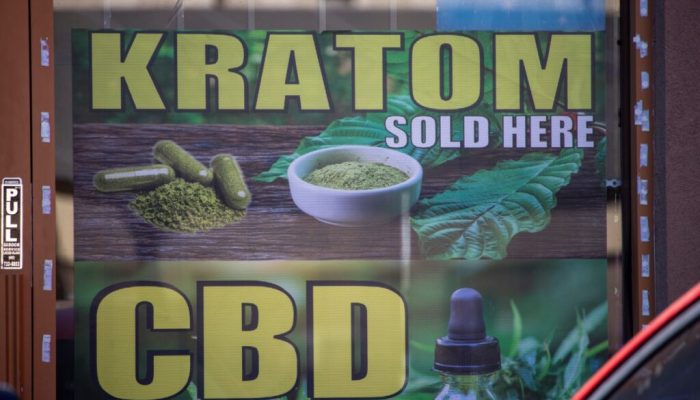An advertisement for Kratom at a shop in Phoenix. Photo by Jerod MacDonald-Evoy | Arizona Mirror
The federal government is seeking to restrict a synthetic kratom product that is already banned in Arizona but easy to find all across the state.
Last week the Food and Drug Administration and the Drug Enforcement Agency announced it is recommending that 7-OH, the informal name for 7-hydroxymitragynine, be scheduled and restricted under the Controlled Substances Act.
The compound is found naturally on the leaves of the kratom plant in small percentages and is responsible for its opioid-like qualities. But lab-created synthetic versions of it, usually in tablet form, often have higher concentrations of 7-OH than one can get from the plant alone.
Kratom, also known as Mitragyna speciosa, is native to Southeast Asia and is related to the coffee plant. Its leaves have long been ground into a powder, which can then be taken in pill form, smoked or turned into tea.
When ingested, kratom interacts with many of the same receptors in the brain that opioids do. Because of that, many advocates say kratom can be used as an alternative to opioids — and can be a tool to fight opioid addiction.
GET THE MORNING HEADLINES.
Last year, the Arizona Mirror spoke with kratom advocates at the Global Kratom Coalition who conducted a “secret shopper” of local gas stations and head shops and found high potency 7-OH products — including some that appeared to be marketed towards children — that the group said violated the state’s pre-existing regulations around kratom products.
That same group now says they are encouraged by the FDA’s recommendation and hope it encourages local law enforcement and Attorney General Kris Mayes to act and get those products pulled from the store shelves in Arizona.
“I think it’s a good thing for consumer safety. I think it is a good thing for rule and law and order,” Matthew Lowe, executive director of the Global Kratom Coalition, told the Mirror. Lowe said he believes the FDA’s report and recommendations will give Mayes and other law enforcement entities “clarity” and the “needed inertia” to protect consumers from these products.
A spokesperson for the AG’s Office said it hasn’t received any details from the FDA regarding new enforcement or how this will impact Arizona. However, the Drug Enforcement Agency will still have to review the FDA’s recommendation before making a scheduling decision.
The DEA has been monitoring kratom since 2011, when the agency listed it as a “drug of concern.”
In 2016, the DEA published in the federal registrar that it intended to classify it as a Schedule I drug, placing it alongside heroin, LSD and cocaine. When a drug is classified under Schedule I, it is deemed to have “no medical use.”
But an outcry from advocates, who raised a variety of claims on the positive impacts of the drug, led to the DEA withdrawing its intent to classify kratom as a Schedule I drug.
The DEA then decided to wait on the Food and Drug Administration to complete a medical and scientific review of the main components of kratom, mitragynine and 7-OH. The FDA has not recognized any form of kratom.
Now the DEA will begin that process it had begun with kratom but limited to 7-OH.
“Attorney General Mayes shares serious concerns about high-potency kratom products — especially their easy access among teens and young adults,” her spokesman, Richie Taylor, told the Mirror. “Our office continues to evaluate potential enforcement actions under Arizona law and is actively monitoring the situation.”
But enforcement and testing of kratom products seems to exist in a gray area, one in which federal authorities have been waiting for each other to act and states have implemented a patchwork of regulations that advocates say aren’t being enforced.
In Arizona, the agency ostensibly responsible for enforcing kratom regulations is the Arizona Department of Health Services. But ADHS has previously said it collects no data on kratom sales and doesn’t proactively do any enforcement, in large part because of uncertainty between state and federal laws.
In 2019, Gov. Doug Ducey signed the Arizona Kratom Consumer Protection Act into law. The measure implemented a number of regulations, including prohibiting the sale to minors and setting guidelines on how kratom is sold and labeled. The law describes kratom as a “dietary supplement,” a designation the FDA has said it rejects but one that advocates embrace.
The act prohibits any kratom product, or derivative, from having a 7-OH level higher than 2%.
But products appearing on store shelves in Arizona and across the country in areas with similar regulations are seeing products with higher 7-OH concentrations than 2%. Products purchased by the Global Kratom Coalition that were labeled as kratom are actually synthetic creations that consist of higher levels of 7-OH, making them more potent than leaf kratom.
The report by the FDA noted that 7-OH products being sold are being found with even higher levels than one would find in the plant itself, citing one study in which the tested products had 7-OH levels that were between 109 to 509% higher than observed in the kratom plant itself.
Data across the country and in Arizona is showing that kratom is appearing in accidental overdose deaths, as well. In Florida, hundreds of deaths have been attributed to the drug, and journalists at the Tampa Bay Times found that many synthetic kratom products were misleading consumers and included high levels of 7-OH and other opioid-like alkaloids.
Centers for Disease Control data reviewed by the Mirror found that there were 30 deaths in Arizona attributed to kratom in 2022, 51 in 2021 and 44 in 2020.
But the FDA found that data is hard to come by because 7-OH products are still new, which could also be contributing to underreporting in the data.
“[A] lack of awareness among consumers of kratom-related products that they are obtaining 7-OH enhanced products, and thus use of 7-OH would likely be underreported in data collected using self-report,” the FDA report says.
The FDA also reviewed a study in which it was found that 7-OH was “more potent than morphine” in a study involving rats. Other studies found that rats will “self-administer” 7-OH by pressing a lever for a drug injection, indicative of it being addictive.
“It is notable that self-administration is a behavior that is produced by drugs that have been placed into every schedule of the [Controlled Substances Act],” the FDA concluded.
“In the current marketplace in the U.S., 7-OH is increasingly being marketed over-the-counter and online, in concentrated forms or sufficient doses to cause harms to those individuals engaging, knowingly or unknowingly, in use of 7-OH,” the FDA said. “This public health threat is troubling and requires immediate and impactful policies to educate consumers and take regulatory action that limits access to 7-OH containing products.”
While the FDA is sounding the alarm, local law enforcement says that they have not seen 7-OH products as a problem.
The Maricopa County Sheriff’s Office said it and is currently not investigating anything in regards to 7-OH products. It also said it has not impounded “any known quantities of 7OH (sic).” Neither has the Arizona Department of Public Safety.
The Phoenix Police Department did not respond to a request for comment.
Research has shown that kratom can be addictive and other studies have shown that lax regulations have led to contaminated products. Some kratom manufacturers are now facing legal challenges over deaths related to their products. One thing many of the studies also agree on is that there is not enough data on kratom and its use, something made difficult by the legal gray area it currently resides in.
Lowe and other kratom advocates are hopeful and see this move by the FDA to focus on 7-OH synthetics as a way to protect consumers and kratom itself, adding that, in “context of a society that has been ravaged by three waves of an opioid crisis,” that being proactive on this issue will help stop a “fourth wave.”
YOU MAKE OUR WORK POSSIBLE.
This post was originally authored and published by Jerod MacDonald-Evoy from AZ Mirror via RSS Feed. Join today to get your news feed on Nationwide Report®.



























